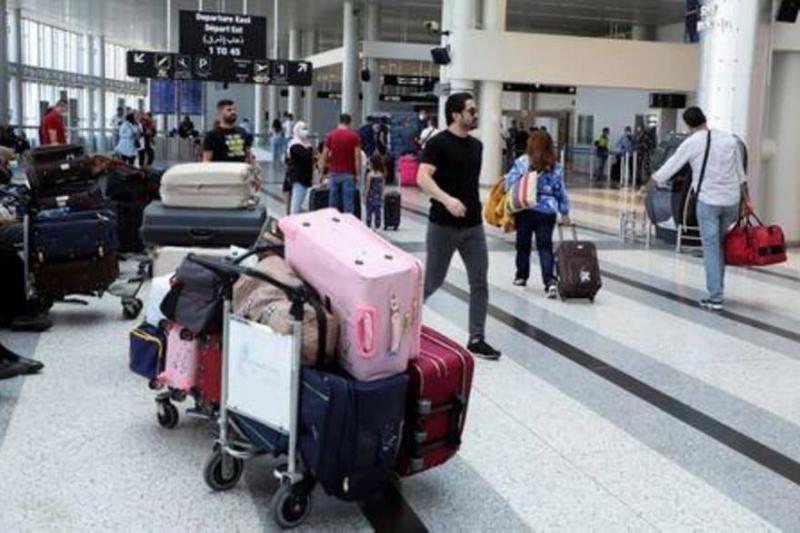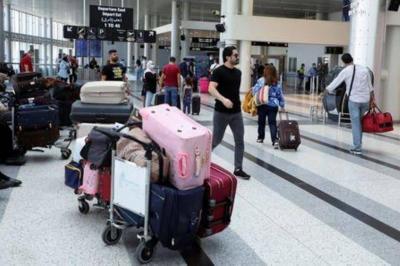After spending three decades supporting the real estate business inherited from his father, Ralph Khoury is preparing to leave his home, an hour away from Beirut, to start a new life in a country he never thought he would visit: Georgia. The 44-year-old father of two daughters stated that if there was any reason for hope, he would immediately reconsider this decision.
The economic collapse in Lebanon over the past few years has had severe repercussions on the daily struggles of Lebanese people, including shortages of essential medicines, long queues for fuel, and inflationary pressures due to the local currency's value dropping by about 90%. Daily life has become increasingly difficult. Many Lebanese who had never considered traveling now feel compelled to start anew elsewhere.
The General Security Directorate reports that passport applications have reached eight thousand requests per day, surpassing its capacity of 3,500 requests daily. Ramzi Al-Rami, head of the public relations department at the Directorate, indicated that the notably increased queues in August are partly due to students traveling abroad for studies before the academic year begins. He added that many of those leaving Lebanon are dual nationals holding second passports or residencies in other countries. However, this is not the case for the Khoury family and many other families.
Lebanon's financial system collapsed in 2019 after decades of corruption and deficit, plunging the country into an economic crisis exacerbated by political disputes, the COVID-19 pandemic, and the Beirut port explosion in August 2020, which resulted in over 200 deaths and devastated large parts of the city, proving to be the last straw for many.
Ralph Khoury explored Georgia over the summer with his brother Rony, looking for an emerging economy where he could leverage his real estate expertise and start a new venture from scratch. Upon arrival in Georgia, Lebanese people are granted a one-year tourist visa and can relatively easily open a bank account and start a business, enabling them to obtain residency.
The two brothers are now packing their bags for the move to Georgia, hoping their families can join them in a year—a painful decision despite the prospect of a better life. Ralph expressed disbelief at having to close this chapter of his life after 32 years of hard work and experience, stating that it's not easy at all and that the decision weighs heavily on his heart.
Rony (49) agreed that the decision wasn't easy but is better for their children's future. He explained that they reached a point where they needed to mitigate their losses and start over, lamenting that Lebanon has become "a graveyard for ambitions and dreams."
In a recent report, the Crisis Observatory at the American University of Beirut stated that hundreds of thousands of Lebanese are leaving in a phenomenon termed "the third exodus." The first exodus occurred in the early 20th century due to famine and World War I, and the second during the Lebanese Civil War from 1975 to 1990.
Alaa Sidani, program coordinator at the Observatory, stated, "During the war, people fled to safer places. But now we don't have a weapons war; we have an economic war." Approximately 300,000 Lebanese emigrated during the first wave and 900,000 during the second wave of the civil war. Efforts are still underway to gather figures for the third wave caused by the economic crisis, but indicators point to a brain drain.
Sidani noted that a quarter of the commercial sector in the country is closed, and around 100 professors from the American University of Beirut have left. Many are departing after incurring severe financial losses as their lifelong savings have been trapped in banks that have prevented depositors from accessing their funds since 2019. She explained that overcoming the feeling of betrayal associated with this is not easy. She believes this migration is irreversible, noting that Lebanon will have to face issues related to an aging population, as those of working age are leaving while older individuals remain.
Tangi Shnakhy (28) and his partners closed the two restaurants they jointly managed in Lebanon to open a new restaurant in Batumi, the second-largest city in Georgia. He stated that the decision to move is final. Despite the language barrier—none of the three speak the predominant language in Georgia—they feel a clear path in establishing the restaurant and feel settled.
In a call from Batumi, he expressed that the three felt disappointed in Lebanon. He noted that one of his partners had to sell his car before traveling to Georgia because he couldn't withdraw his savings from the bank. The hardest part for Shnakhy was leaving his sick mother with his father and ten-year-old sister. He clarified that he would only return for vacations and to visit family and enjoy Lebanese food, but he would not return to live in Lebanon.




